Ofstad Visiting Scholar Program
Ofstad Visiting Scholar Workshops
Spring 2024
Nina Furstenau
 “Food: A Love Story”
“Food: A Love Story”CRWT 418.01/ENG 610.07G
February 12-16, 2024, 9:30-11:50 a.m. MTWRF
The class focus is sensory writing using food as the lens in current U.S. culture. Shirtsleeves are rolled up and elbows are on the table as you find your place in this rich, diverse field of work. We take a hard look at what is evocative and engages readers. You will shape your writing into sharp focus and make stories fresh with input from fellow students and the instructor. You will generate new material that will answer the burning question, “Why are you telling me this now?” with work that is situated within a clearly defined wider culture. Come ready to create culinary narrative that can, as Kevin Kerrane says in the Art of Fact, “make facts dance.”
Julie L. Moore
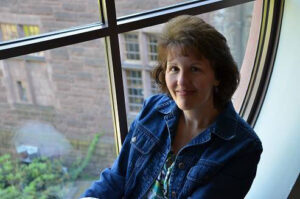 “American Poetry of Protest”
“American Poetry of Protest”CRWT 418.02/ENG 610.08G
February 26-March 8, 2024, 3:30-5:20 p.m. MWF
In his famous essay “Why I Write,” George Orwell says, “I see that it is invariably where I lacked a political purpose that I wrote lifeless books,” and in response, Natasha Trethewey says in her essay bearing the same title that her poetry has found “a sense of purpose in the beautiful idea of social justice for all human beings.” With this in mind, this creative writing course will focus on reading and writing poems about social justice. Students will read acclaimed and diverse American poets such as Trethewey, Claudia Rankine, Ada Limon, Joy Harjo, Natalie Diaz, Layli Long Soldier, Kevin Young, Jericho Brown, Kazim Ali, Ross Gay, Maxine Kumin, Mary Oliver, W.S. Merwin, Julia Kasdorf, and others. Students will also read and discuss essays about the reasons for writing poetry and will write their own poetry manifesto expressing their views of the value, challenges, and pitfalls of political poetry. Likewise, students will write and workshop 2-3 original protest/political poems in response to the news of the day.
Kelly Wright
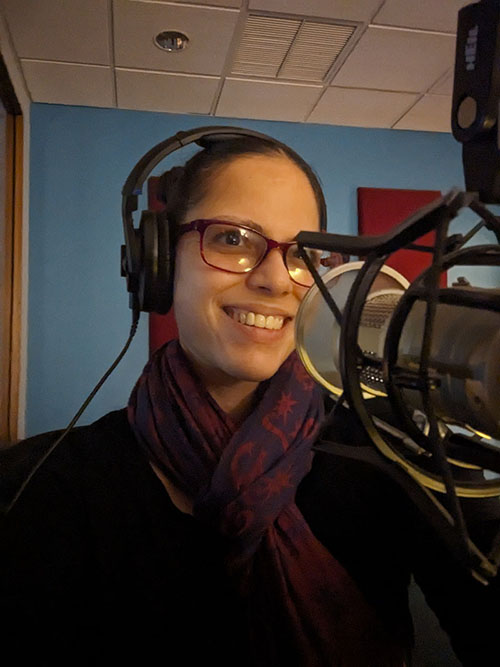 “Things You Can’t Say”
“Things You Can’t Say”LING 224, Topics in Linguistics//ENG 610G Gra 1 credit
April 8-12, 2024, 8:30-10:20 a.m. M-F
“Things You Can’t Say” is a class about bad words—what they are, and what processes all languages share with respect to them. This is a class on how a word becomes inappropriate, about the ways naughty words operate in the brain. This is a class on what it means to tell people what they can or cannot say and how that control extends through spoken, written, and signed language—and through the lifetime. We will also investigate what kinds of topics or words are typically considered to be taboo or off-limits and how bans on blue language are enforced. In so doing, we’ll discover that what is considered profane is determined by social and cultural norms, situational expectations, and individual preferences, habits, and identities; we will consider the universality of linguistic operation beneath that dynamism. Indeed, some of the language considered offensive in our society mere decades ago is now considered utterly mundane—and vice versa. The goal of this class is to take unmentionable and illicit language as an inherently interesting lens through which to learn about human linguistic capability and creativity. Swearing is, scientifically and socially, cool. We will approach “Things You Can’t Say” from the viewpoint of multiple disciplines that concern themselves with the study of Language and its use, including Linguistics, Neurobiology, Anthropology, Archeology, Psychology, Literature, Gender and Women’s Studies, Rhetoric, Communication Disorders, and The Law.
Students will have the opportunity to engage in self-directed research on a pejorative word of their choosing and will have the space to present that research to our classroom community. We will be talking about topics that are offensive, and we will also say, read, and sign vulgar words, phrases, and gestures that make people uncomfortable in the wider world. Be ready for frank and mature discussions about controversial topics and to work within yourself to encourage openness for reconsidering your ideas about language and society.
Fall 2023
Alexandra Rowland
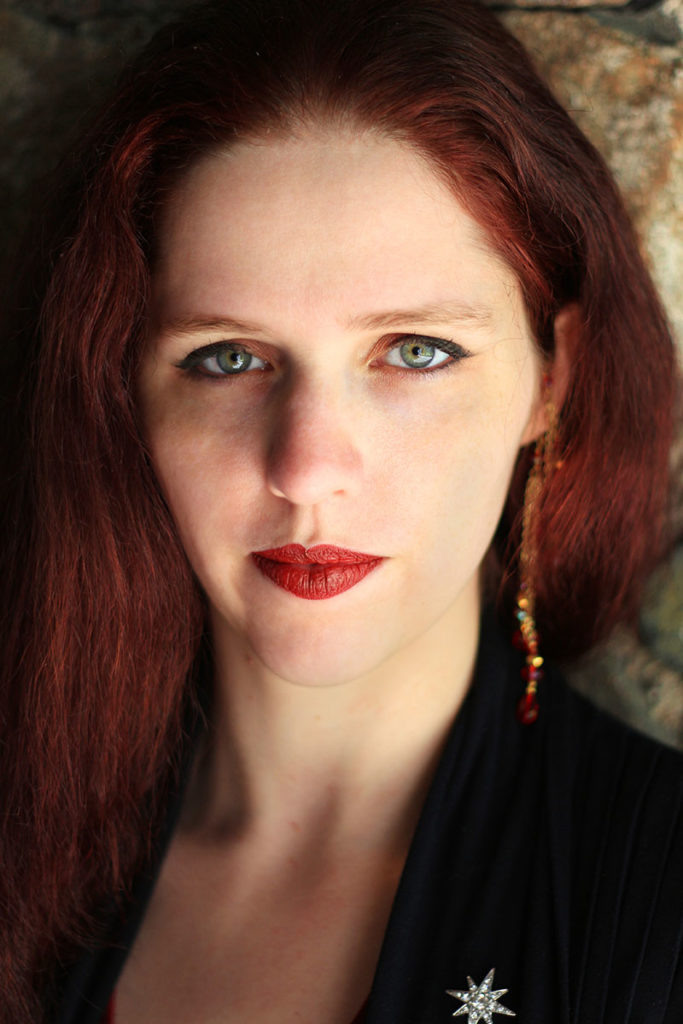 CRWT 418/610G: “Creative Writing and Publishing for Sci-fi and Fantasy Authors”
CRWT 418/610G: “Creative Writing and Publishing for Sci-fi and Fantasy Authors” August 21-October 10, 2023
Dreaming of a career as a sci-fi/fantasy author? This class covers every element of what you’ll need to know both for the writer you are today and the one you want to be someday. What makes a strong and compelling protagonist? How much world-building do you need to do before you start writing? How do you come up with a cool magic system? What does “story structure” mean from an authorial perspective? How do you develop an idea into a plot? How do you publish a short story or a novel once you’ve written it? What are advances, royalties, and licensable rights, and how do you get paid for your creative work? Will you need a literary agent? What are an author’s responsibilities to their audience? We will answer all these questions and more, but at the end of the day, there’s only one thing to learn: All you have to do is tell a good story. Everything else is window dressing.
Dr. Taylor Jones
LING 413/ENG 610G: “Linguistics, Culture, and Conflict”
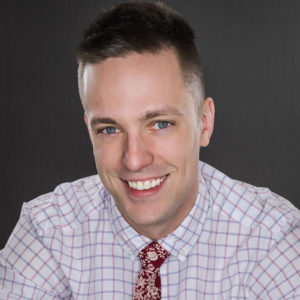 This course introduces elements from sociolinguistics and pragmatics to explore how linguistics relates to DEI and cross-cultural competence. In it, we will discuss controversial social and political issues and drivers of conflict in the workplace and the world. Topics will include communication styles, conversational implicature, linguistic identity construction, and how we use linguistic cues to categorize others. Hot button issues will include microaggressions, BLM, pronouns, and “wokeness.”
This course introduces elements from sociolinguistics and pragmatics to explore how linguistics relates to DEI and cross-cultural competence. In it, we will discuss controversial social and political issues and drivers of conflict in the workplace and the world. Topics will include communication styles, conversational implicature, linguistic identity construction, and how we use linguistic cues to categorize others. Hot button issues will include microaggressions, BLM, pronouns, and “wokeness.”
SPRING 2023
Anand Prahlad
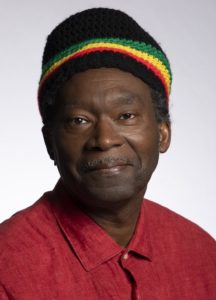 CRWT 418: Movement, Identity, and Resonances of Jazz in Poetry, Anand Prahlad
CRWT 418: Movement, Identity, and Resonances of Jazz in Poetry, Anand PrahladJan. 23-27, 2023
This workshop will explore resonances of jazz in modern poetry. Jazz here is not limited to music, though, but encompasses a spiritual and cultural aesthetic, rooted in black America; an aesthetic that has become a largely unrecognized architecture that permeates and shapes American identities. We will be concerned, in particular, with how the jazz aesthetic can influence the timing and movement within poems, expressed through conventions such as line breaks, the breath and breadth between stanzas, vowel and consonant sounds, and quilted or collaged imagery. In exploring identity, our focus will be primarily on the uses of “I” in poems that highlight gender and disabilities.
Kyle W. Eveleth
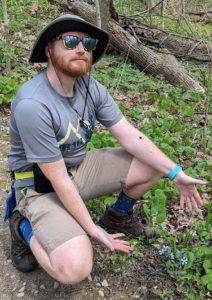 ENG 418: Special Topics–Press Start to Play: Conceptualizing Playful Literatures
ENG 418: Special Topics–Press Start to Play: Conceptualizing Playful LiteraturesFebruary 27-March 10, 2023
Conceptually, “play” covers a large swath of territory. True to its name, the territory of play is mutable and variegated, with permeable borders and complex contact zones. Suffice to say that much literature is “playful” in this myriad of senses, especially literature for children. In this course, we will examine texts that are “playful” in the sense of game-like, or texts with significant participatory components, including games, pop-up books, choose-your-own-adventure novels, interactive television programs, and old-fashioned novels. Some will have been designed, nominally at least, for young audiences. All will reflect the imperatives of playful literature, namely an incentivization of play (however that is conceptualized) that is balanced with the direction of narrative. By focusing on a few selected forms of playful literature, this course will serve as an introduction to playful literatures from theoretical and experiential perspectives. We will interrogate the common argument in game studies that playful structures and storytelling structures lie at odds with one another while seeking to better understand what makes literary artifacts “playful.” Students can expect to read some theory, play some games, experience some novel interactions, and develop their own playful literature (writ large).
Carrie Gillon
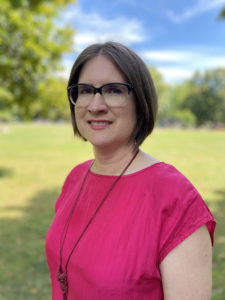 (Abbreviated Open Course Listing: “Lang & Racial/Social Justice”
(Abbreviated Open Course Listing: “Lang & Racial/Social Justice”(LING 413, Advanced Topics, 1 credit)
March 27-31, 2023
Language and social and racial justice are intrinsically linked. In this one-week course, we will explore how social and racial justice are inseparable from the study and use of language. This course is relevant to any student of linguistics, or any person who wants to know more about how language affects their everyday life. At the end of the week, students will be better equipped to identify how linguistic bias oppresses speakers/signers and how to spot linguistic discrimination. Throughout the week, students will work on a podcast episode or zine on a real-life instance of linguistic discrimination.
Nina Furstenau
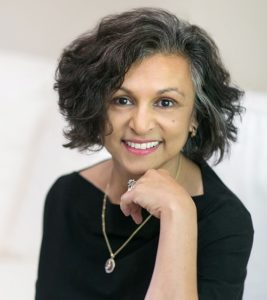 CRWT 418: Food—A Love Story
CRWT 418: Food—A Love StoryApril 3-7, 2023
The class focus is sensory writing using food as the lens in current U.S. culture. Shirtsleeves are rolled up and elbows are on the table as you find your place in this rich, diverse field of work. We take a hard look at what is evocative and engages readers. You will shape your writing into sharp focus and make stories fresh with input from fellow students and the instructor. You will generate new material that will answer the burning question, “Why are you telling me this now?” with work that is situated within a clearly defined wider culture. Come ready to create culinary narrative that can, as Kevin Kerrane says in the Art of Fact, “make facts dance.”
FALL 2022
Dr. Caitlin Coons
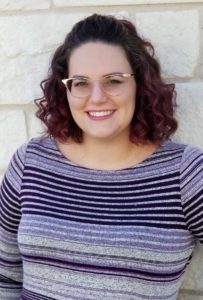 LING 319.02: Structures and History of Signed Languages
LING 319.02: Structures and History of Signed LanguagesAug. 22-Oct. 11, 2022
This course introduces students to the linguistics of signed languages, with particular attention to Mexican Sign Language and American Sign Language, among others. Students will become familiar with the linguistic structure of signed languages (phonetics, phonology, morphology, syntax, semantics and pragmatics, and lexicon) and how signed languages emerge, are acquired, and used in Deaf communities (including topics such as language contact with signed and spoken languages, bi- and multilingualism, language variation and change, and linguistic discrimination and the social context of use within majority hearing societies). Visiting Ofstad scholar Caitlin Coons is a PhD candidate in linguistics at the University of Texas.
Nzingha Kendall
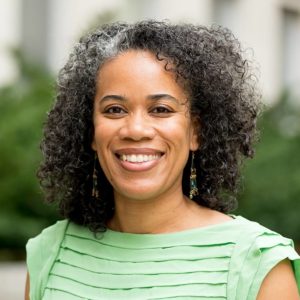 ENG 418.06: Special Topics in English—Black Women’s Experimental Filmmaking
ENG 418.06: Special Topics in English—Black Women’s Experimental FilmmakingOct. 17-22, 2022
This course will introduce students to experimental film works by black women. We will investigate how experimental techniques offer black women creative freedom. Funding their films independently while working outside of traditional studio systems, these women’s works insist on pushing the bounds of what filmmaking can accomplish. In consideration of the range of black experiences across the world, this course will engage with filmmakers from the Americas, Europe, as well as the African continent. Dr. Kendall is an assistant professor of film and screen studies at Pace University.
SPRING 2022
Dr. Tabitha Lowery
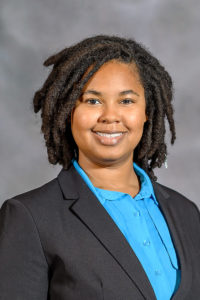 ENG 418: Black in the Past: Octavia Butler’s Grim Fantasy
ENG 418: Black in the Past: Octavia Butler’s Grim FantasyJanuary 30-February 6, 2022
Deemed the godmother of Afrofuturism, the celebrated African American writer Octavia Butler left behind a career that changed the science-fiction world entirely after her unexpected passing in 2006. As the first-ever science fiction writer to receive the MacArthur Fellowship, Butler wrote with an eye towards the future and consistently offered an honest observation of humanity. Though one of a few Black women writers publishing in the white-male dominated science fiction genre, Butler transcended conventions and offered outlooks on not only issues of race, gender, sex, and power, but of empathy, social normativity, environmentalism, and many more. This course will take a look at Kindred: A Graphic Novel Adaptation to discover Butler’s reimagining of a past filled with memory, pain, and terror. We will explore how the graphic novel form enhances our readings of Butler’s text and how it helps readers confront the past. We will culminate the class with a creative project that gathers elements of the historical past to inform our present and futures. Butler’s novel has proven timeless, just as her legacy. As Kindred shows, sometimes confronting our nation’s past can be painful, but necessary. The workshop is led by Dr. Tabitha Lowery, assistant professor of African American literature and culture at Coastal Carolina University.
Dr. Rachel Weissler
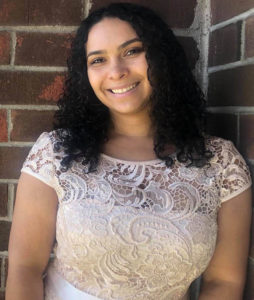 LING 413: Language and Gender in Marginalized Communities
LING 413: Language and Gender in Marginalized CommunitiesMarch 14-25, 2022
In this two-week course, we will look at how aspects of identity influence and interact with gender and language practices of minoritized communities within the U.S. population. We will investigate how gender, race, sexual orientation, age, religion, and social and political status impact linguistic gender practices. We will center Kimberlé Crenshaw’s theory of intersectionality to help us think about why studying and researching minoritized communities is crucial in linguistics research and beyond. We will engage with literature describing linguistic practice (phonetic, syntactic, semantic, pragmatic), how it is produced, and how it is perceived. Having had introduction to linguistics will be helpful for this class, but it is not required; the takeaways from this course will be beneficial to students interested in linguistics, sociology, anthropology, ethnic studies, gender studies, and political science. Students will leave this course with a greater understanding of specific sociolinguistic variables present in language varieties in the U.S., how language and gender interact with other identities in various ways, and overall, the importance of incorporating the study of minoritized communities in linguistics in order to broaden and refine our understanding human language.
LING 413: Perspectives on Linguistics and Perception
March 14-25, 2022
In this course, we consider different methods through which to examine linguistic perception. We will engage with literature describing methods through which to analyze linguistic perception such as sociophonetic research, implicit measures such as neural processing and eye-tracking, and also discuss the social outcomes and realities of linguistic perception. Having had introduction to linguistics will be helpful for this class, but it is not required; the takeaways from this course will be beneficial to students interested in linguistics, sociology, anthropology, psychology, cognitive science, speech and hearing sciences, and beyond. Students will leave this course with a greater understanding of the social landscape and ideologies that influence how people are perceived based on how they speak, methods through which we can hone in and quantify perception as it happens via behavioral studies, and finally, the benefits of integrating social and psychological theories.
Mark Wisniewski
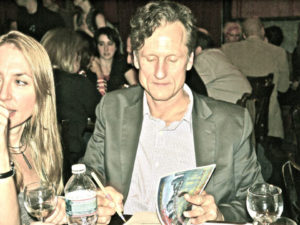 CRWT 418: The Five Major Steps to Writing a Short Story
CRWT 418: The Five Major Steps to Writing a Short StoryMarch 28-April 1, 2022
A one-week workshop, given by a best-selling writer of literary fiction (both short stories and novels), in the art and practice of writing short stories. Mark Wisniewski will take his students through the five key steps to starting, drafting, and completing a short story: 1) brainstorming and outlining; 2) Plot structuring and point of view; 3) Choosing the optimal voice, beginning to draft (endings first!); Drafting the middle of the story and line-editing; 5) Completing and sharing the finished product with others via a reading. Mark Wisniewski is a widely published fiction writer whose work has been praised by people ranging from Salman Rushdie to Daniel Woodrell. He is also one of the top Book Doctors in the country, who has helped dozens of people find publication, secure agents, and win national fiction awards.
Fall 2021
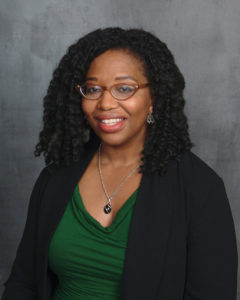 Fall 2021 First-Block Course
Fall 2021 First-Block CourseENG 331: Studies in African-American Literature
“What Shall I Tell My Children Who Are Black?”: Black Childhood, History, and Trauma in American Literature and Culture
This seven-week course explored the representation of Black children and their history in American literature and culture. Black literature and culture are rich with stories of resilience, triumph over seemingly impossible odds, and what it means to come of age in a society in which racial trauma and violence are part of the rites of passage. In this interdisciplinary course, learners had the opportunity to examine critically and creatively literature, film, music, and art about Black children and Black childhood, with particular attention to work by and about Black girls and women. Dr. Angela Shaw-Thornburg (Ph.D. in English, Rutgers University, 2006) is an independent scholar with extensive research and teaching experience in the areas of African American literature and culture, women’s studies, and higher education.
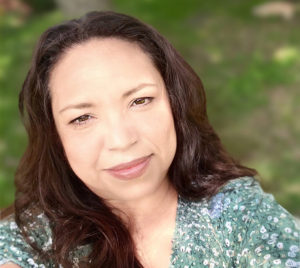 CRWT 418: One-Week Poetry Workshop
CRWT 418: One-Week Poetry WorkshopSeptember 13-17, 2021 (in person)
From September 13-17 of 2021 students had a unique opportunity to study and work with Maria Miranda Maloney, a leading Latina poet, editor, and bilingual publisher. Students of this one-week class received help with their poetry writing, including advice from someone who has actually run a highly successful small press, and also learned about contemporary issues in Latinx writing and studies.
Maria Miranda Maloney is the founder of Mouthfeel Press a Bilingual Press that has published dozens of books of poetry in English and Spanish, and the author of The Lost Letters of Mileva (Pandora Lobo Productions Press, 2014) and The City I Love (Ranchos Press, 2011). Her poetry and essays have appeared in Bellevue Literary Review, MiPoesias, The Catholic Reporter, The Texas Review, Acentos Review, and many other literary journals. She is the literary curator and Outreach Coordinator for The Smithsonian Latino Center, Washington D.C. She is currently a reading and writing teacher at Trinity ISD in Texas.
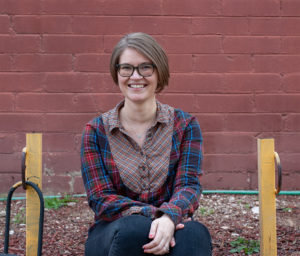 LING 413: Language and Social/Racial Justice
LING 413: Language and Social/Racial JusticeSeptember 6-10, 2021 (in person)
“What’s language got to do with racial and social justice?” Language and social and racial justice are intrinsically linked. This one-week course explored how social and racial justice are inseparable from the study and use of language. This course is relevant to any student of linguistics, or any person who wants to know more about how language affects their everyday life. It equipped students to identify how linguistic bias oppresses speakers/signers and how to spot linguistic discrimination. Throughout the week, students worked on a podcast episode or zine on a real-life instance of linguistic discrimination. This special Ofstad workshop was taught by visiting Ofstad scholar Dra. Megan Figueroa, research scientist at the Tweety Language Development Lab at the University of Arizona, though perhaps better known as co-host of the popular podcast, The Vocal Fries.
Spring 2021
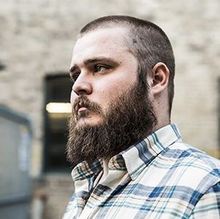 Neil Hilborn is a bestselling author, and with more than 150 million views to his credit, he is the most-watched poet ever. He has performed in 41 states and 8 countries, and in 2019 alone he drove more than 25,000 miles to do poetry. In several rented minivans, he saw the Pacific three times and the Atlantic seven times. Originally from Houston, Texas, he now lives in Saint Paul, Minnesota.
Neil Hilborn is a bestselling author, and with more than 150 million views to his credit, he is the most-watched poet ever. He has performed in 41 states and 8 countries, and in 2019 alone he drove more than 25,000 miles to do poetry. In several rented minivans, he saw the Pacific three times and the Atlantic seven times. Originally from Houston, Texas, he now lives in Saint Paul, Minnesota.
ENG 418 (CRN 1752): Slam Poetry
February 1-5, 2021
While there doesn’t have to be a difference between “page poems” and “stage poems,” there are certain techniques we can use as both writers and performers to ensure that audiences understand us. Through subtle use of things like metre, rhyme, anaphora, assonance, and consonance, students explored the ways in which writing can directly inform performance and thereby audience comprehension. They also wrote poems that students performed in a public show at the end of the course.
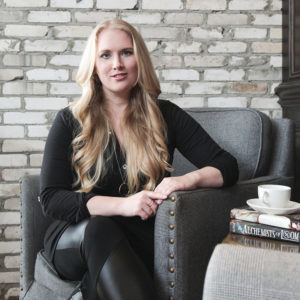 Elise Kova is a USA Today bestselling author. She graduated from an MBA program, lived in Japan for a bit, and worked for a Fortune 500 technology company. Now she writes and lives as a full-time author. She’s happy to call Florida her home but is always looking forward to her next trip. Her books include A Deal with the Elf King, A Dance with the Fae Rogue, A Trial of Sorcerers, Vortex Visions, Chosen Champion, Failed Future, Sovereign Sacrifice, and Crystal Caged as well as the Air Awakens Series, Loom Saga Series, and Wish Quartet Series.
Elise Kova is a USA Today bestselling author. She graduated from an MBA program, lived in Japan for a bit, and worked for a Fortune 500 technology company. Now she writes and lives as a full-time author. She’s happy to call Florida her home but is always looking forward to her next trip. Her books include A Deal with the Elf King, A Dance with the Fae Rogue, A Trial of Sorcerers, Vortex Visions, Chosen Champion, Failed Future, Sovereign Sacrifice, and Crystal Caged as well as the Air Awakens Series, Loom Saga Series, and Wish Quartet Series.
ENG 418 (CRN 1754): Publishing Creative Writing with Elise Kova
April 19 – 23, 2021
In this one-week, on-campus seminar Elise Kova taught students about the various aspects of publishing creative writing such as editing, marketing, networking, deciding on a cover, etc. Kova is invested in opening up the publishing industry by encouraging creative writers and providing them with the information that will help them to further pursue the path of publication.
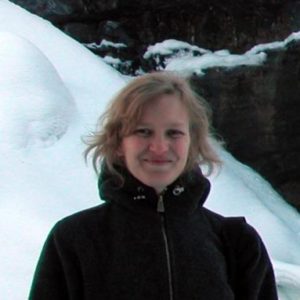 Lucy Thomason, a linguistic researcher for the Smithsonian Institution, has extensively researched the Meskwaki language, which is spoken by the indigenous people of the Meskwaki tribe. She has helped to develop and compile a Meswaki-English and English-Meswaki dictionary, while also continuing her work as a museum technician of linguistics at the Smithsonian Institute. Dr. Thomason has a Ph.D. in Linguistics from the University of Texas at Austin and has been a full-time researcher with the Smithsonian Institute in Washington, D.C., for almost two decades, winning a Smithsonian Science Achievement Award in 2014 for her co-authored Meskwaki-English and English-Meskwaki Dictionary. She has taught undergraduate and graduate courses at Georgetown University and George Washington University.
Lucy Thomason, a linguistic researcher for the Smithsonian Institution, has extensively researched the Meskwaki language, which is spoken by the indigenous people of the Meskwaki tribe. She has helped to develop and compile a Meswaki-English and English-Meswaki dictionary, while also continuing her work as a museum technician of linguistics at the Smithsonian Institute. Dr. Thomason has a Ph.D. in Linguistics from the University of Texas at Austin and has been a full-time researcher with the Smithsonian Institute in Washington, D.C., for almost two decades, winning a Smithsonian Science Achievement Award in 2014 for her co-authored Meskwaki-English and English-Meskwaki Dictionary. She has taught undergraduate and graduate courses at Georgetown University and George Washington University.
LING 413 (CRN 1786): Meskwaki
March 29 – April 02, 2021
Dr. Lucy Thomason taught a one-week, on-campus workshop about the Meskwaki writing system and how researchers solve some of the linguistic puzzles associated with it. In the late 1800s, many speakers of Meskwaki (a Central Algonquian language currently spoken in Iowa) adopted papepipo (also called Great Lakes Algonquian Syllabary), a writing system invented by one of their Potawatomi-speaking cousins. Papepipo is brilliantly designed to be easy to write, if you speak Potawatomi, Meskwaki, or one of a handful of other languages. It’s somewhat more difficult to read, as it encodes only four of eight distinct Meskwaki vowels, and writes only 18 of 31 distinct Meskwaki consonant clusters. As a result, the Smithsonian’s Meskwaki manuscripts are rife with puzzles. This one-week course described how to go about solving papepipo puzzles, explaining what kinds of things we can decipher, and what kinds of linguistic and cultural mysteries might remain mysteries. The workshop also discussed ways in which the cultural and cosmological ideas informing these manuscripts relate to widespread ideas in North America, expressed in prehistoric as well as modern art. This involved a crash course in Meskwaki morphology, syntax, and discourse, demonstrating along the way why Edward Sapir claimed that “single Algonkin words are like tiny imagist poems.”
Fall 2020
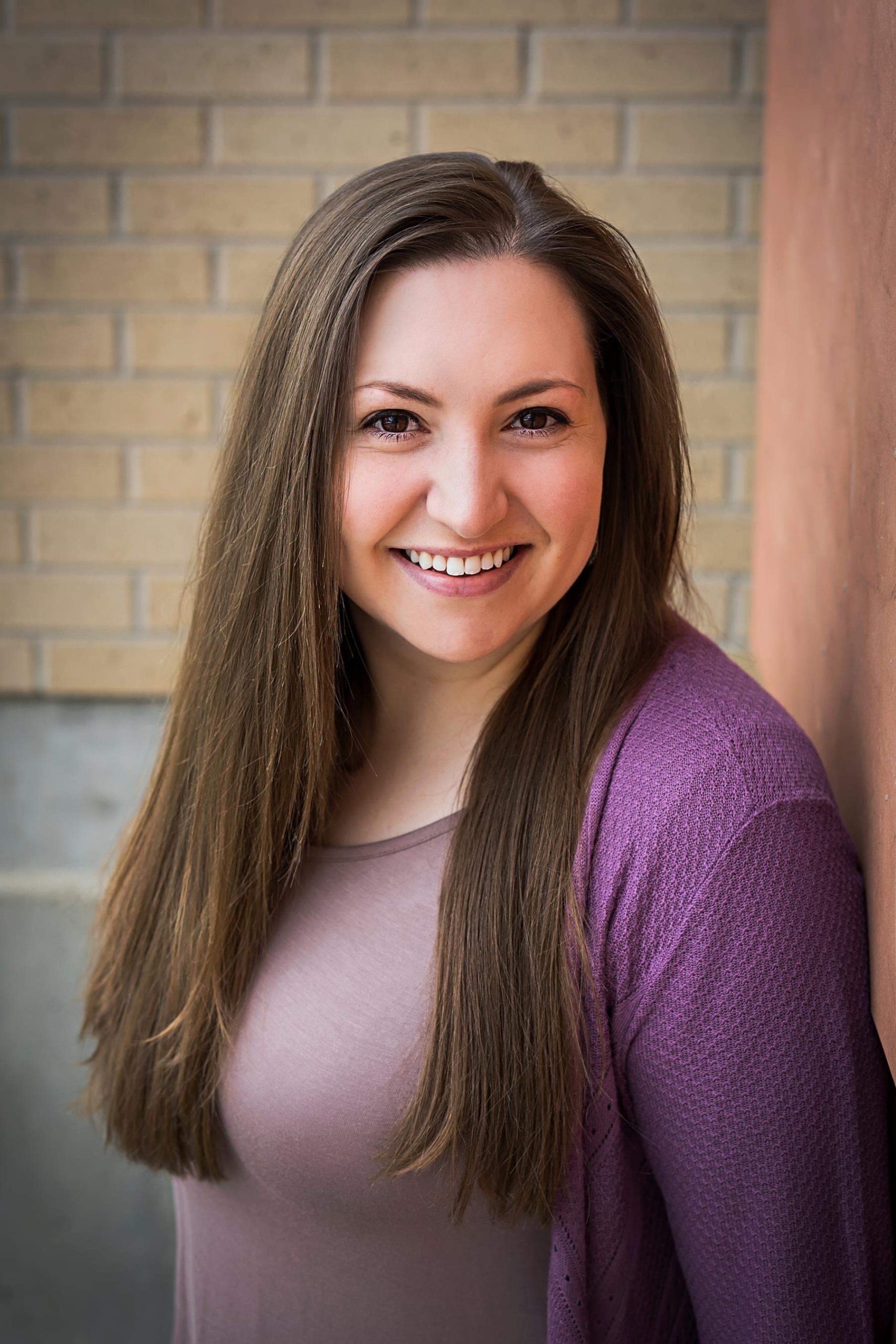 Tricia Levenseller is the author of the Daughter of the Pirate King duology, Warrior of the Wild, The Shadows Between Us, and Blade of Secrets. She writes young adult high fantasies with heavy romantic subplots. Initially from a small town in Oregon, Tricia now lives next to the Rocky Mountains with her bossy dog, Rosy. She received her degree in English Language and editing, and she is thrilled that she never has to read a textbook again. When she’s not writing or reading, Tricia enjoys putting together jigsaw puzzles, playing volleyball, playing Overwatch with her siblings, and watching shows while eating extra-buttered popcorn.
Tricia Levenseller is the author of the Daughter of the Pirate King duology, Warrior of the Wild, The Shadows Between Us, and Blade of Secrets. She writes young adult high fantasies with heavy romantic subplots. Initially from a small town in Oregon, Tricia now lives next to the Rocky Mountains with her bossy dog, Rosy. She received her degree in English Language and editing, and she is thrilled that she never has to read a textbook again. When she’s not writing or reading, Tricia enjoys putting together jigsaw puzzles, playing volleyball, playing Overwatch with her siblings, and watching shows while eating extra-buttered popcorn.
ENG 418 (CRN 7501): Elements of Speculative Fiction
October 26 – October 30, 2020
Every story has the same basic elements. There are characters who want things and there are characters who have things happen to them that force them to act. The tricky part is in being unique. In this class, students discussed how to create unique characters, inciting incidents, magic systems, worlds, and much more to make their novel stand out in an overcrowded market.
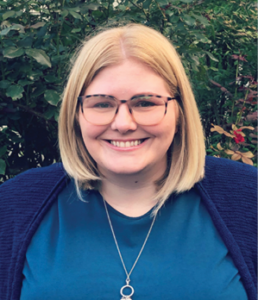 Darcey Browning earned her Ph.D. in Linguistics from the University of Texas at Arlington, 2017. Her dissertation was “#TwitterDiscourseMarkers: A Corpora Based Study of the Pragmatic Functions of Hashtags.”
Darcey Browning earned her Ph.D. in Linguistics from the University of Texas at Arlington, 2017. Her dissertation was “#TwitterDiscourseMarkers: A Corpora Based Study of the Pragmatic Functions of Hashtags.”
LING 413 (CRN 6201): Advanced Linguistics: Digital Discourse
October 7 – December 11, 2020
Dr. Browning’s course took a closer look at the language used on digital devices. She has been studying and teaching about internet linguistics for about a decade. Since internet language shares qualities of both written and verbal communication, one could expect to see similar linguistic devices being used for felicitous discourse. However, character constraints and asynchronous times for communication have caused internet languages to be more innovative, especially in pragmatics and word formation. Topics included the languages used in social media, texting, and chat. Students gained some familiarity with corpus-based research methods.
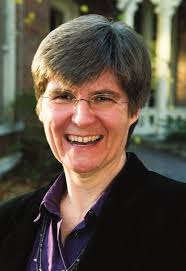 Anne Morey is an associate professor in English at Texas A&M University. Her book Hollywood Outsiders: The Adaptation of the Film Industry, 1913-1934 deals with Hollywood’s critics and co-opters. She has published an anthology on Stephani Meyer’s “Twilight” phenomenon (Ashgate 2012) and had completed Claudia Nelson a book on the reuse of the ancient world in contemporary children’s and YA fiction (Oxford UP 2019). She is now at work on a book about the Junior Literary Guild and children’s preparation for citizenship and is co-writing with Shelley Stomp a history of women’s involvement in American silent cinema, to be published by Columbia University Press.
Anne Morey is an associate professor in English at Texas A&M University. Her book Hollywood Outsiders: The Adaptation of the Film Industry, 1913-1934 deals with Hollywood’s critics and co-opters. She has published an anthology on Stephani Meyer’s “Twilight” phenomenon (Ashgate 2012) and had completed Claudia Nelson a book on the reuse of the ancient world in contemporary children’s and YA fiction (Oxford UP 2019). She is now at work on a book about the Junior Literary Guild and children’s preparation for citizenship and is co-writing with Shelley Stomp a history of women’s involvement in American silent cinema, to be published by Columbia University Press.
ENG 322 (CRN 7508): The Woman’s Film
August 17 – October 6, 2020
This special Ofstad first-block course taught by Texas A&M University professor Dr. Anne Morey investigated the phenomenon of the woman’s film, particularly from the 1930s to the 1950s. Through historical research and close readings of film texts such as Now, Voyager, Imitation of Life, and Mildred Pierce, students pursued questions that pertained to the connections between Hollywood and the female audience, the woman’s narrative in publishing and the film industry, and the presence or absence of the woman’s film today, among others. Dr. Anne Morey’s book Hollywood Outsiders: The Adaptation of the Film Industry, 1913-1934, deals with Hollywood critics and co-opters.
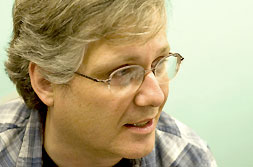 Scott McCloud is well-known for his non-fiction books about comics and comic creation, such as in Understanding Comics (1993), Reinventing Comics (2000), and Making Comics (2006), all of which use comics themselves. He is the recipient of the Russ Manning Award (1985), the Jack Kirby Award (1985), the Eisner Award (1994), and three Harvey Awards (1994), and he has continued to generate comics to this day. Now he is working on a comic about visual communication.
Scott McCloud is well-known for his non-fiction books about comics and comic creation, such as in Understanding Comics (1993), Reinventing Comics (2000), and Making Comics (2006), all of which use comics themselves. He is the recipient of the Russ Manning Award (1985), the Jack Kirby Award (1985), the Eisner Award (1994), and three Harvey Awards (1994), and he has continued to generate comics to this day. Now he is working on a comic about visual communication.
ENG 418 (CRN 7257): Comics: Theory and Practice
August 21 – 23, 2020
This one-week workshop combined in-class visual lectures, discussions, and intensive hands-on exercises focused on the art of making comics. No drawing experience was required. This was a class about visual decision-making (‘writing with pictures’), not technical rendering. Both beginners and experienced artists were welcome, and all necessary materials were provided. Scott McCloud is the recipient of the Eisner Award for Best Comics-Related Book (1994) and the Harvey Award for Best Writer (1994).